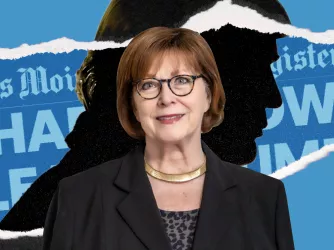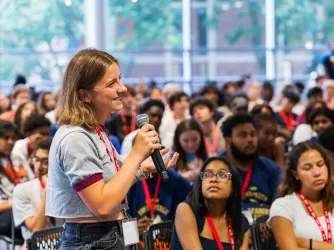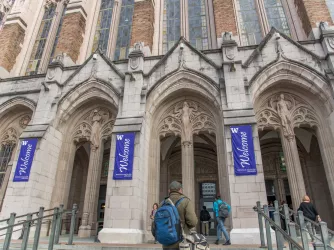Table of Contents
Victory for Free Speech: Third Circuit Strikes Down University of Virgin Islands' Speech Codes
PHILADELPHIA, August 18, 2010—In a victory for free speech on campus, the United States Court of Appeals for the Third Circuit issued an opinion today in McCauley v. University of the Virgin Islands striking down unconstitutional speech policies maintained by the University of the Virgin Islands (UVI) on First Amendment grounds. The Third Circuit—whose jurisdiction includes the Virgin Islands as well as Pennsylvania, New Jersey and Delaware—found the university's regulations prohibiting "offensive" or "unauthorized" signs and conduct causing "emotional distress" unconstitutional. The Third Circuit also upheld the federal district court's invalidation of a policy that forbade causing "mental harm" or demeaning or disgracing any person. In December 2009, the Foundation for Individual Rights in Education (FIRE) filed a friend-of-the-court brief urging the Third Circuit to reach this result.
"Today's landmark ruling in favor of free expression on campus is still more proof that unconstitutional speech codes, when challenged in court, will not and cannot survive proper judicial scrutiny," FIRE Vice President Robert Shibley said. "The Third Circuit's decision today reinforces yet again the decades of legal precedent striking down codes that violate the First Amendment rights of students at public institutions like the University of the Virgin Islands. For the many public universities and colleges that somehow haven't gotten the message yet, let me be clear: Maintaining speech codes violates the law."
Former UVI student Stephen McCauley filed suit against UVI in the U.S. District Court of the United States Virgin Islands in May 2009, alleging that UVI's application of its "Hazing-Harassment" policy against him violated his First Amendment rights. The policy prohibits "any act which causes ... mental harm or which ... frightens, demeans, degrades or disgraces any person." McCauley also alleged that UVI was violating the First Amendment rights of all UVI students by maintaining this policy and other unconstitutional speech codes, including regulations prohibiting "offensive" or "unauthorized" signs and conduct causing "emotional distress."
In its August 2009 opinion, the district court invalidated UVI's "Hazing-Harassment" policy as unconstitutionally overbroad, but erred by allowing two other flawed policies to remain intact. Making matters worse, the district court's opinion incorrectly analyzed collegiate speech restrictions by applying court decisions concerning grade school and high school speech standards.
McCauley appealed the ruling in September 2009. On December 22, 2009, FIRE filed a friend-of-the-court brief with the Third Circuit, asking the court to stand by its landmark decision in DeJohn v. Temple University, 537 F.3d 301 (3d Cir. 2008), and to reverse the lower court's ruling upholding the flawed policies. Attorney L. Theodore Hoppe, Jr., a member of FIRE's Legal Network, represented FIRE in the filing.
Today's ruling, authored for a unanimous panel by Judge D. Brooks Smith, strikes down the two flawed UVI policies upheld by the lower court. Noting that a "desire to protect the listener cannot be convincingly trumpeted as a basis for censoring speech for university students," the Third Circuit found UVI's policy forbidding "offensive" or "unauthorized" signs to be unconstitutionally overbroad. Similarly, citing its opinion in DeJohn, the court found UVI's prohibition of conduct causing "emotional distress" equally untenable, deeming the policy "entirely subjective" and finding that it "provides no shelter for core protected speech." The opinion notes that under the unconstitutional policy, "[e]very time a student speaks, she risks causing another student emotional distress," and concludes that this "heavy weight" does "substantial" damage to free speech on campus.
The Third Circuit's opinion also usefully spells out the sharp distinction between the relatively limited First Amendment rights afforded to high school students and the robust right to freedom of expression enjoyed by college students, a crucial difference ignored by the lower court and argued at length in FIRE's brief. Citing "the differing pedagogical goals of each institution, the in loco parentis role of public elementary and high school administrators, the special needs of school discipline in public elementary and high schools, the maturity of the students, and, finally, the fact that many university students reside on campus and thus are subject to university rules at almost all times," the Third Circuit held that "[p]ublic universities have significantly less leeway in regulating student speech than public elementary or high schools."
"With today's decision, the Third Circuit has made clear that the First Amendment rights of college students are distinct from their high school counterparts and require special protection," said Will Creeley, FIRE's Director of Legal and Public Advocacy. "In light of the university's unique role as a true marketplace of ideas in our nation's liberal democracy, adult college students must be granted the freedom to engage in debate without fear of unconstitutional punishment. The Third Circuit has demonstrated once again that efforts to infantilize college students violate the Constitution and will not stand in court."
FIRE is a nonprofit educational foundation that unites civil rights and civil liberties leaders, scholars, journalists, and public intellectuals from across the political and ideological spectrum on behalf of individual rights, due process, freedom of expression, academic freedom, and rights of conscience at our nation's colleges and universities. FIRE's efforts to preserve liberty on campuses across America can be viewed at thefire.org.
CONTACT:
Will Creeley, Director of Legal and Public Advocacy, FIRE: 215-717-3473; will@thefire.org
Recent Articles
FIRE’s award-winning Newsdesk covers the free speech news you need to stay informed.

FIRE’s defense of pollster J. Ann Selzer against Donald Trump’s lawsuit is First Amendment 101

China’s censorship goes global — from secret police stations to video games

High schoolers: Become a voice for tomorrow, today!
